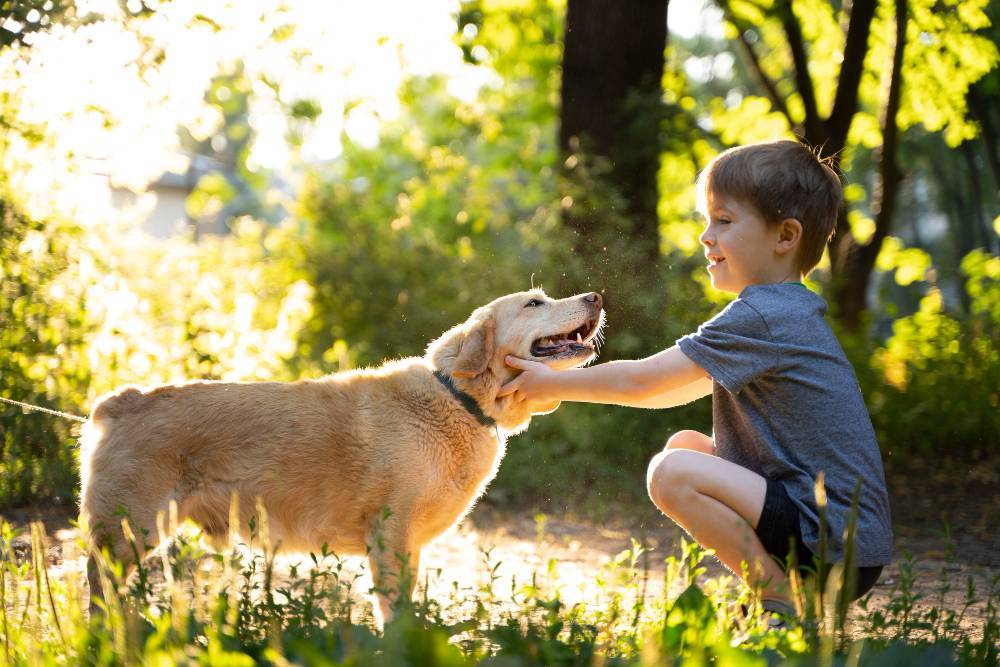What Makes Children Love Animals More Than Adults?
Discover the intriguing factors that make animals so captivating to children. Learn about the emotional and developmental benefits of children’s love for animals.
Children’s love for animals is a universal phenomenon observed and studied for generations. Research has shown that animals can attract and engage children in a way that no other living creature can. Whether it’s a fluffy white puppy or a colorful butterfly, animals can evoke strong emotional responses in children that are unmatched by any other stimuli.
Animals have been shown to have numerous benefits for children, including fostering social skills, empathy, and emotional regulation. By understanding what makes animals unique to children, we can better incorporate them into children’s lives and promote their healthy development.
This article explores the reasons why children love animals more than adults. We discuss how animals can help children develop social skills, empathy, and emotional regulation. We also explore animals’ unique role in a child’s life as a source of comfort, security, and freedom.

5 Fascinating Reasons Why Children Love Animals More Than Adults
1. Animals Become Social and Emotional Teachers for Children
Animals have a unique way of teaching children social and emotional skills. By interacting with animals, children learn to be sensitive to the needs of others as they observe and respond to their animal friends’ body language and cues. Children also learn to express themselves and share their feelings in a safe space where they feel unjudged and accepted by their animal companions.
Moreover, animals provide children with an opportunity to practice caregiving and nurturing. By taking care of their pet’s basic needs, such as feeding, grooming, and playing, children learn to be responsible and empathetic towards others.
Research has shown that animals can also help children develop self-esteem and confidence. According to a study published in the Journal of Personality and Social Psychology, children who had a pet had higher levels of self-esteem and were more prevalent among their peers.
2. Fascination of Animals in a Child’s World
Children are naturally drawn to animals and find them fascinating. Whether it’s a household pet, a wild animal at the zoo, or even a bug in the backyard, animals capture children’s attention in a way that few other things can. The unique appeal of animals to children is due to several factors.
Firstly, animals evoke emotional responses in children that are not always present in interactions with people. Animals offer unconditional love, acceptance, and a non-judgmental presence that is comforting to children. This can help children develop sensitivity to others as they learn to recognize and respond to the emotional cues of animals.
Secondly, animals offer a safe space for children to share their feelings. Children often feel more comfortable confiding in their pets than in people, as they feel their pets will not judge them. Animals can offer comfort and support, helping children process difficult emotions and cope with stressful situations.
Lastly, animals offer children the opportunity to practice caregiving and nurture. Children often take on the caretaker role with their pets, providing food, water, and affection. For instances if they have a pet turtle, children will be well fascinated by their role as a caretaker and will be aware of foods for turtle. Such behavior This can help children develop empathy and responsibility as they learn to care for another living being.
3. Animals Help Children Feel In Control
Animals have a unique ability to provide children with a sense of control and empowerment. Unlike in their relationships with adults, children often have more power and control in their animal interactions. By caring for and protecting a vulnerable animal, children can experience a sense of responsibility and purpose that can be difficult to achieve in their relationships with people.
Furthermore, animals offer a safe space for children to practice communication and social skills. Unlike adults, who may judge or critique a child’s communication style, animals offer a non-judgmental presence that allows for open and honest communication. This can be especially important for children struggling with social interactions or who have experienced trauma.
The power dynamics of animal relationships also highlight the importance of teaching children empathy and caregiving. By learning to care for and protect an animal, children can develop essential skills in nurturing and compassion that can translate to their relationships with people. These skills can also help children develop a deeper understanding of their own emotions and the emotions of others.
4. Comfort and Security Offered by Animals
Animals have a unique ability to provide comfort and a sense of security to children. They offer a source of emotional support during times of stress or fear. The mere presence of an animal can be calming and reassuring. This is why animals are often used in therapy settings to help people cope with anxiety, depression, and trauma.
Children often form strong attachments to their pets or other animals they encounter. These relationships can provide a sense of safety and familiarity that is hard to find elsewhere. Animals can also offer unconditional love and acceptance, which can be particularly important for children who may feel like they don’t fit in or are struggling to connect with others.
Caring for an animal can give a sense of purpose and responsibility that can be incredibly empowering.
Overall, the comfort and security that animals offer children are a testament to the power of these unique relationships. Animals can be a source of love and support that children can carry with them throughout their lives.
5. Bonds Between Children and Animals
The unspoken bonds between children and animals are a fascinating phenomenon. There is something mysterious and instinctual about children’s love for animals that goes beyond simple companionship. Animals provide a safe and non-judgmental space for children to explore and process complex emotions like fear, anger, and sadness. They offer a listening ear, a comforting presence, and a source of unconditional love.
Unlike human relationships, animals are not bound by social etiquette and communication rules. Children often feel a sense of freedom and authenticity in their interactions with animals, which can be therapeutic and empowering. Animals also offer a unique perspective on life and the world, which can help children to develop empathy, understanding, and respect for all living beings.
The bond between children and animals is not just one-sided, either. Animals can benefit from the love and care of children just as much as children benefit from their companionship. Children can learn essential life skills such as responsibility, compassion, and empathy by caring for and nurturing vulnerable creatures.
Conclusion
Animals have a unique and influential role in children’s lives. They serve as social and emotional teachers, evoke strong emotional responses, offer comfort and security, provide a sense of control, and create unspoken bonds with children.
Through animal interactions, children can develop sensitivity to others, practice caregiving and nurturing, explore and process complex emotions, and feel a sense of safety and familiarity. Animals also contrast adult-child communication, creating a safe and non-judgmental space for children to express themselves.

